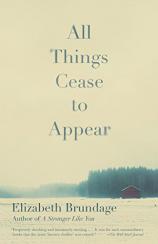Reading Group Guide
Discussion Questions
All Things Cease to Appear

Introduction
Chosen is a sleepy rural hamlet: a town where everybody knows everybody, where doors are left unlocked, where men and women have worked the land for generations. It is also a town in transition, with class divides becoming sharply apparent after wealthy Manhattanites move to the area seeking a pastoral idyll. One such family, the Clares --- George, a charismatic art history professor; his beautiful and shy wife, Catherine; and their three-year-old daughter --- seems to be picture-perfect. When they move into their new home, a charming but dilapidated farmhouse, Catherine imagines a contented rural existence, yet it soon becomes apparent that happiness will be elusive. Their home, a once-thriving dairy farm, has been witness to a horrific tragedy, the repercussions of which are still felt throughout the town --- and especially in eerie apparitions in their own home. Eventually, a dark pall is cast over the Clares’ domestic bliss, straining the relationship between husband and wife. When Catherine is brutally murdered, all fingers point to George, unraveling a complicated portrait of a marriage that is as compulsively readable as it is expertly executed.
When a committed local cop probes the case, eager to prove George’s guilt, much is exposed about the circumstances of the Clares’ marital distress. From his infatuation with a local waitress to the bold lies he has told about his academic career, George’s methodical deception and manipulative behavior reveal a man far more disturbed than what the townspeople ever imagined. Boldly plotted and darkly riveting, ALL THINGS CEASE TO APPEAR is a masterful exploration of psychology and motivation, family and community, and the forces that shape our collective identity.
Questions and Topics for Discussion
1. The issue of class differences weighs heavily throughout ALL THINGS CEASE TO APPEAR. Discuss the faltering farm economy in the area and how that affects morale. Which characters seem to represent the “old guard” of the town? How does distrust of the wealthy Manhattan set factor into the town’s perception of George?
2. Discuss the role of otherworldly influences. How does Brundage use voice and character to create a foreboding, eerie feeling throughout the novel? Discuss George’s hesitance to believe in these spirits. How does this create a gulf between him and Catherine? When, if ever, does Catherine feel validated for believing in the presence of these spirits?
3. Discuss the idea of “lost mothers.” as explored throughout. How do the Hale brothers each cope with the loss of their beloved mother? How does Catherine become a mother figure for the Hales? Which brother does she have the greatest influence on over time?
4. How does Uncle Rainer help to shape Cole’s understanding of the world? Describe Rainer’s emphasis on education. How does Cole take this to heart?
5. Discuss Willis’s trajectory throughout the novel. How would you describe her disposition as a teenager? What has shaped her worldview? How does her relationship with George affect her later choices in lifestyle and career?
6. How is the concept of motherhood explored throughout the novel? How would you define motherhood for Catherine? Mary? How do the obligations of motherhood tie into wifely obligations? Which characters represent a backlash to the established 1970s ideals of womanhood?
7. Discuss the evolution of Catherine’s personality. In the months before she is murdered, how does Catherine begin to defy the expectations of her role as wife? How is her discovery of poetry via Adrienne Rich significant to her development as a character? What other influences shape her?
8. Discuss the scene in which George cuts Willis’s hair during an intimate encounter. Why do you think he chose to do that? Explore the power dynamic in their relationship.
9. Describe the early stages of George’s relationship with Catherine. Do you think they ever shared genuine feelings for each other, or was their relationship borne out of obligation? How do Catherine’s Catholic upbringing and religious beliefs tether her to the confines of their relationship?
10. As the Clare case unfolds, Travis Lawton is determined to bring Catherine’s killer to justice. How does this affect his relationship with his own wife? Do you think that the case contributed to their marital discord?
11. Justine is a defining character in ALL THINGS CEASE TO APPEAR. How does her perspective offer insight into George and Catherine’s relationship? Discuss the relationship between Justine and her husband, Bram. How do they defy the conventional expectations for marriage and couplehood?
12. Discuss Franny’s reentry into Chosen. At what moment does she become witness to her mother’s happiness? Who gives her the best insight into her mother’s character?
13. The section “Exile” gives significant perspective into Catherine’s attitudes on motherhood, her new home in Chosen, and her relationship with George. How did you interpret her tone over the course of the letters? Do you think she ever sent any true updates to her family members, or did she use these hidden letters as a means of conveying her emotions? Why do you think Brundage chose to include this section at that point in the novel?
14. Consider how George changes over the course of the novel. When were you first convinced of his guilt? Which moments in ALL THINGS CEASE TO APPEAR did you find to be most disturbing?
15. Discuss the conclusion of the novel. Were you satisfied with how George met his end? Do we actually know that he has died? How did you interpret Franny’s last conversation with her father?
All Things Cease to Appear
- Publication Date: February 7, 2017
- Genres: Fiction, Mystery, Psychological Suspense, Psychological Thriller, Suspense, Thriller
- Paperback: 464 pages
- Publisher: Vintage
- ISBN-10: 1101911484
- ISBN-13: 9781101911488








